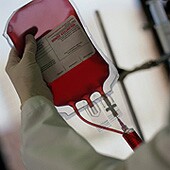
TUESDAY, Feb. 25, 2014 (HealthDay News) — Getting a blood transfusion while undergoing angioplasty to reopen your heart arteries may increase your risk of having a heart attack, stroke or dying, a new study finds.
Whether angioplasty patients get transfused or not appears to vary by hospital and not by the patient’s condition, found the study, published in the Feb. 26 issue of the Journal of the American Medical Association.
“It seems like much of that variability is related to hospital and doctor practice patterns rather than the actual risk of the patients,” said lead researcher Dr. Matthew Sherwood from the Duke Clinical Research Institute in Durham, N.C.
This inconsistency and the potential for possible harm points to a need for studies to really determine whether or not angioplasty patients should get transfused, he said. Until then, surgeons should use strategies that reduce the risk for bleeding, the study authors suggested.
Blood transfusions, which give a patient blood through an IV line inserted into a blood vessel, may be used to replace blood lost during surgery. Transfusions also might be ordered when patients can’t make blood properly.
During angioplasty, Sherwood explained, patients are at risk for bleeding when a catheter is inserted into an artery to expand it or place a stent to keep it open. Drugs given to prevent clotting also increase the risk for bleeding.
“These patients have a lot of risk for bleeding, so if they have anemia, physicians are often worried and they will give a transfusion,” Sherwood noted. Patients with anemia don’t have enough healthy red blood cells to carry oxygen through the body.
It’s possible that the transfusion itself causes these heart attacks, strokes and deaths, perhaps because the blood is old, he pointed out.
“Transfusion of red blood cells is potentially harmful to you as the blood cells age,” Sherwood said. Research has shown that patients given red blood cells older than 21 days do worse compared with patients who receive younger red blood cells, he added.
In addition, the steps that donated blood go through to make it safe for transfusion may cause inflammation, which could harm patients with heart problems, Sherwood said.
If red blood cells actually promote inflammation or bleeding, “that’s a bad combination,” Sherwood noted.
Patients who receive transfusions could also be older and sicker than other patients. However, the researchers tried to account for these factors, he said.
The take-away from this study? “We don’t know whether patients benefit or might be harmed by getting transfusions,” Sherwood stated.
Prior studies have raised concerns that transfusions pose problems for certain heart patients, said Dr. Gregg Fonarow, a professor of medicine and associate chief of the division of cardiology at the University of California, Los Angeles, David Geffen School of Medicine.
“Whether receiving a transfusion is a marker of patients at increased risk or may be contributing to these adverse outcomes requires further study,” Fonarow said.
Until there is a definitive answer, Fonarow advises against transfusing these heart patients whenever possible.
To pinpoint the risk of transfusions, Sherwood’s team collected data on more than 2.2 million patients who had angioplasty, with or without stenting, at more than 1,400 U.S. hospitals between July 2009 and March 2013.
In all, slightly more than 2 percent of patients had a transfusion, the findings showed. About 96 percent of hospitals gave a transfusion to less than 5 percent of patients, while 4 percent of hospitals transfused 5 percent of patients or more.
When Sherwood’s group compared patients who received a transfusion with those who didn’t, they found that transfused patients had a greater risk of having a heart attack (about 5 percent versus 2 percent).
Similarly, transfused patients were more likely to suffer strokes (2 percent versus 0.2 percent) and die in the hospital (about 12 percent versus about 1 percent), according to the report.
Patients most likely to receive a transfusion were older, female and more likely to have high blood pressure, diabetes, kidney disease and a previous heart attack or heart failure, the researchers noted.
Although the study found an association between blood transfusions and increased risk of negative outcomes in some angioplasty patients, it did not prove a cause-and-effect relationship.
More information
For more information on angioplasty, visit the U.S. National Library of Medicine.
Copyright © 2026 HealthDay. All rights reserved.

